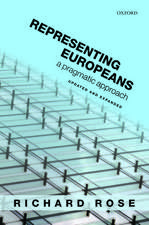Inheritance in Public Policy: Change Without Choice in Britain
Autor Richard Rose, Phillip L. Daviesen Limba Engleză Paperback – 5 noi 2013
Although politicians promise innovation and change when they run for office, once elected they face inherited commitments to programs initiated by their predecessors, legacies that severely limit their freedom of choice. In this trail blazing work, Richard Rose and Phillip L. Davies systematically examine the ways in which decisions made by past generations of administrators control policy-making in the present.
Basing their conclusions on a unique study of hundreds of public programs in effect in Britain since the end of World War II, Rose and Davies show that the impact of an administration's choices is greatest long after its term is concluded. Even though individual politicians have left office, their agenda is carried forward by the force of political inertia—the laws, public agencies, and budgets in continuing effect and the expectations of beneficiaries.
The limited choices that each administration makes are of two very different types. Some reflect careful deliberation over the years and are incorporated in the legacy of successive administrations. Others are trial-and-error attempts to deal with dissatisfaction arising from conditions that often lead to failure. The authors test three theories to account for differences in the persistence of particular types of policy. They conclude that the biggest stimulus for choice (and failure) comes from the turbulence of the market. Social programs are adopted much less often but are much more durable because they concern the enduring needs of families.
Basing their conclusions on a unique study of hundreds of public programs in effect in Britain since the end of World War II, Rose and Davies show that the impact of an administration's choices is greatest long after its term is concluded. Even though individual politicians have left office, their agenda is carried forward by the force of political inertia—the laws, public agencies, and budgets in continuing effect and the expectations of beneficiaries.
The limited choices that each administration makes are of two very different types. Some reflect careful deliberation over the years and are incorporated in the legacy of successive administrations. Others are trial-and-error attempts to deal with dissatisfaction arising from conditions that often lead to failure. The authors test three theories to account for differences in the persistence of particular types of policy. They conclude that the biggest stimulus for choice (and failure) comes from the turbulence of the market. Social programs are adopted much less often but are much more durable because they concern the enduring needs of families.
Preț: 264.16 lei
Nou
Puncte Express: 396
Preț estimativ în valută:
50.55€ • 52.77$ • 41.83£
50.55€ • 52.77$ • 41.83£
Carte tipărită la comandă
Livrare economică 04-18 aprilie
Preluare comenzi: 021 569.72.76
Specificații
ISBN-13: 9780300206463
ISBN-10: 0300206461
Pagini: 268
Dimensiuni: 140 x 210 x 18 mm
Greutate: 0.31 kg
Editura: Yale University Press
Colecția Yale University Press
ISBN-10: 0300206461
Pagini: 268
Dimensiuni: 140 x 210 x 18 mm
Greutate: 0.31 kg
Editura: Yale University Press
Colecția Yale University Press
Notă biografică
Richard Rose, director of the Centre for the Study of Public Policy at the University of Strathclyde and Fellow of the British Academy, is internationally known for his pioneering work on comparative politics and public policy. Phillip L. Davies works for the Central Policy Unit, Liverpool City Council.


















